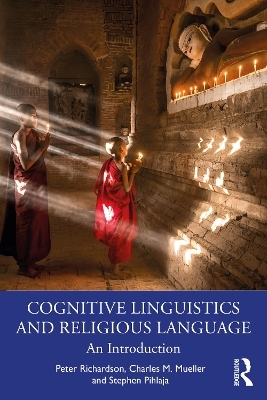
Cognitive Linguistics and Religious Language
Routledge (Verlag)
978-0-367-48461-3 (ISBN)
This book comprehensively introduces Cognitive Linguistics and applies its tools to religious language. Drawing on authentic samples from a range of faiths, text types, and modes of interactive discourse, the authors accessibly define concepts like embodied cognition, agency, metaphor analysis, and Dynamic Systems Theory; illustrate how they can be used in analyzing religious language; and offer thorough pedagogical material to aid learning and application. Advanced students and scholars of linguistics, discourse analysis, cognitive science, and religious and biblical studies will benefit from this practical guide to understanding and conducting research on religious discourse.
Peter Richardson is Professor of Linguistics at Hokkaido Bunkyo University, Japan. His research focuses on Cognitive Linguistics, theology, and religious language. Charles M. Mueller is Professor of English Language and Culture at Fuji Women’s University, Hokkaido, Japan. His research focuses on applied linguistics, Cognitive Linguistics, metaphor, and religious language. Stephen Pihlaja is Reader in Stylistics at Newman University, Birmingham, UK. His research focuses on discourse analysis and inter-religious interaction.
Table of Contents
Title Page *
Table of Contents *
Table of Figures *
Acknowledgements *
1 Chapter One: Introduction *
1.1 Defining religion *
1.2 Ways of being religious *
1.3 Religious language *
1.4 Cognitive Linguistics and religion *
1.5 Overview of the book *
Discussion questions *
2 Chapter Two: Categorization *
2.1 Categories in cognitive science *
2.2 Elements of idealized cognitive models *
2.3 LCCM theory and religious language *
Discussion questions *
3 Chapter Three: Conceptual Metaphor *
3.1 Defining and identifying conceptual metaphor *
3.1.1 Mapping across two domains *
3.1.2 Identifying metaphor *
3.2 The function of metaphor in religious language *
3.2.1 Accessibility and understanding of mystery *
3.2.2 Conveying perspective and marking membership *
3.2.3 Construing the abstract as concrete and tangible *
3.2.4 Providing structure to an ultimate purpose *
3.2.5 Light metaphors *
Discussion questions *
4 Chapter 4: Metonymy *
4.1 Identifying metonymy *
4.2 Types of metonymy *
4.3 The function of metonymy *
4.4 The origins of metaphor and metonymy *
4.5 Metonymy and metaphor in religious language *
Discussion questions *
5 Chapter Five: Agency *
5.1 Agency in discourse analysis *
5.2 Figurative and literal conceptions of divine agency *
5.3 Levels and types of agency *
5.3.1 Levels of agency *
5.3.2 Agency and frames *
Discussion questions *
6 Chapter Six: Force Dynamics *
6.1 Force dynamics basics *
6.2 Force dynamics and religious language *
6.3 Agency and force dynamics in mystical language *
Discussion questions *
7 Chapter Seven: Conceptual Blending *
7.1 Types of conceptual blends *
7.2 Blending in religious language *
7.3 Strategic use of blends within discourse *
7.4 The Ritual of the Four Instruments *
7.5 Elaborate blends in ritual *
Discussion questions *
8 Complex System Theory *
8.1 Complex Systems Theory *
8.2 Discourse Dynamics Approach *
8.3 Applying the DDA *
Discussion questions *
9 Conclusion *
Discussion questions *
References *
Index *
| Erscheinungsdatum | 23.10.2020 |
|---|---|
| Zusatzinfo | 21 Line drawings, black and white; 21 Illustrations, black and white |
| Verlagsort | London |
| Sprache | englisch |
| Maße | 152 x 229 mm |
| Gewicht | 180 g |
| Themenwelt | Geisteswissenschaften ► Psychologie ► Allgemeine Psychologie |
| Geisteswissenschaften ► Psychologie ► Verhaltenstherapie | |
| Geisteswissenschaften ► Religion / Theologie | |
| Geisteswissenschaften ► Sprach- / Literaturwissenschaft ► Sprachwissenschaft | |
| ISBN-10 | 0-367-48461-7 / 0367484617 |
| ISBN-13 | 978-0-367-48461-3 / 9780367484613 |
| Zustand | Neuware |
| Informationen gemäß Produktsicherheitsverordnung (GPSR) | |
| Haben Sie eine Frage zum Produkt? |
aus dem Bereich


